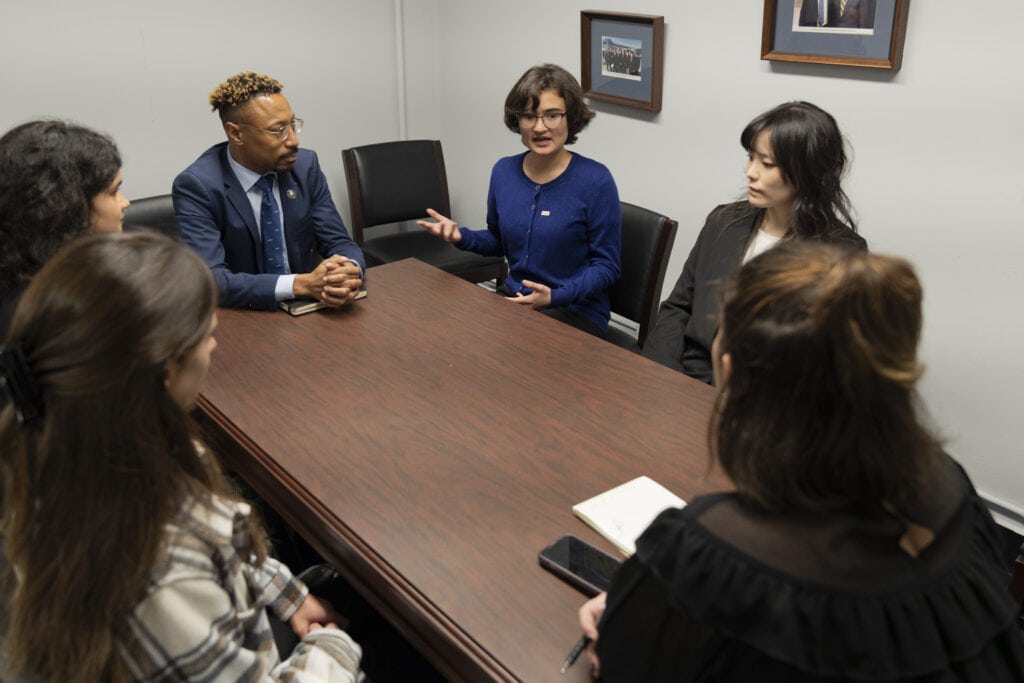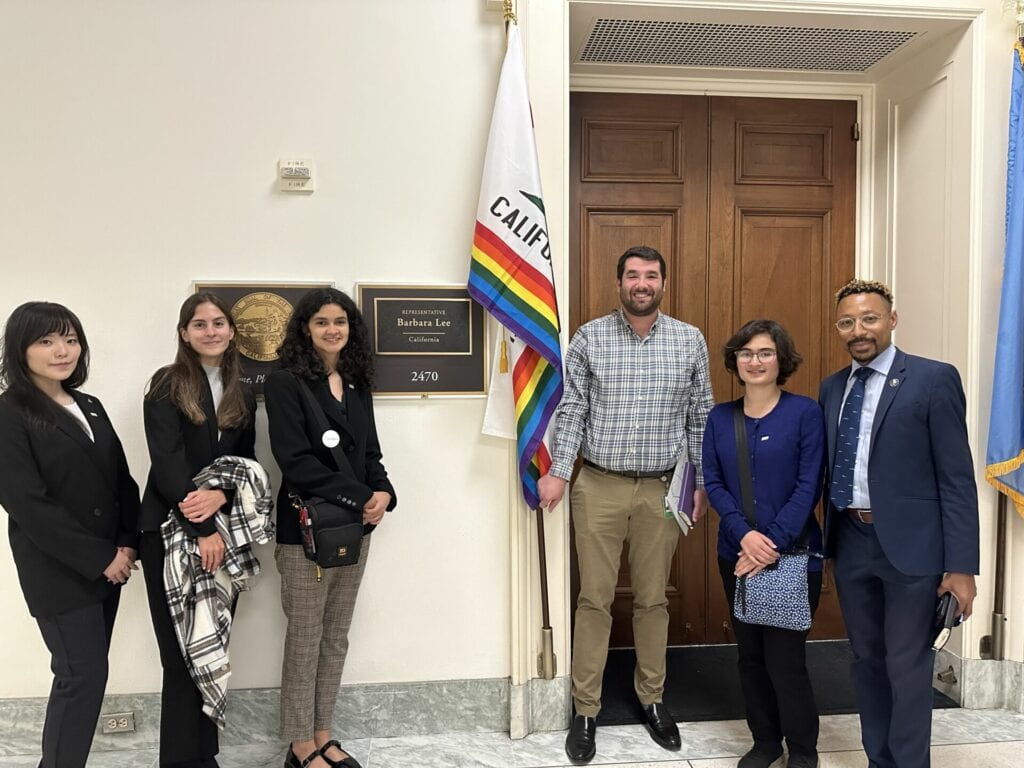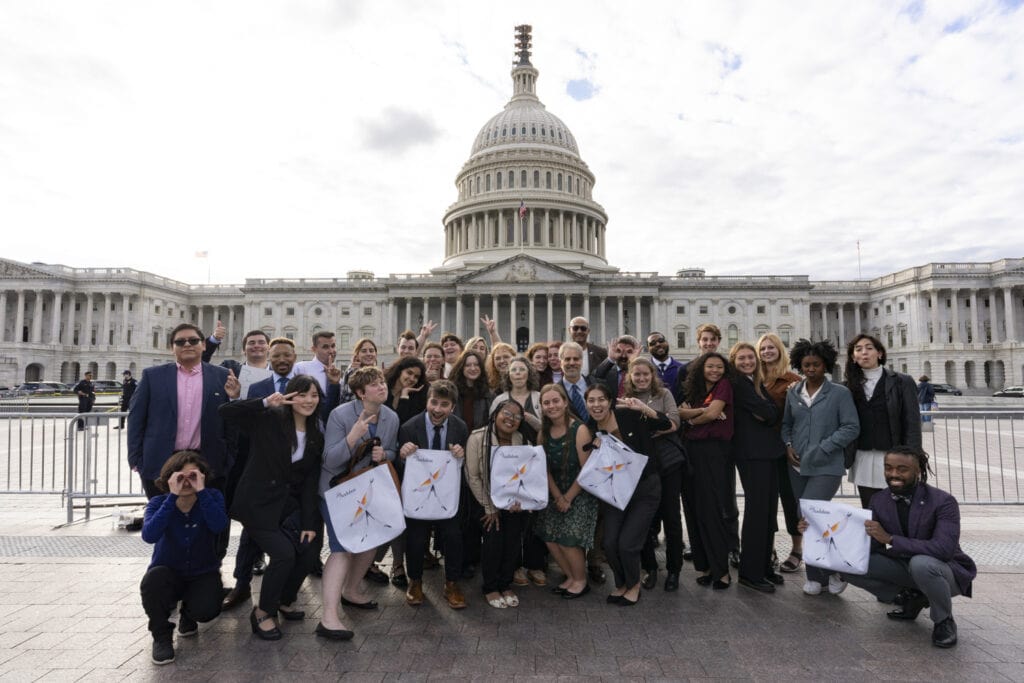Audubon’s Save the Seabirds Fly-In
By Sierra Glassman and Emily Banno
We’ve lost 70% of seabirds worldwide over the last 70 years. Our warming climate pushes the forage fish that seabirds eat deeper and further offshore, and overfishing puts additional pressure on these important food resources. Loss of shoreline habitats leaves coastal communities vulnerable to floods and deprives seabirds of crucial nesting areas. As aspiring ornithologists passionate about conserving both our birds and communities, we were eager to sign up for Save the Seabirds Fly-in, an opportunity for Audubon on Campus students to speak with lawmakers in support of federal protections for forage fish and investment in natural infrastructure.
On October 16, 2023, we landed at Reagan National Airport after a collective six hours of sleep. After depositing our carry-ons in our rooms, we went off to explore the Smithsonian Natural History Museum. We were particularly drawn to the “Birds of D.C.” display, its taxidermied Passenger Pigeon and Carolina Parakeet — a grim reminder of what we were trying to prevent. We returned to the hotel to join up with the rest of the cohort for dinner at the Lauriol Plaza. Gustavo Figueroa, the Student Outreach Associate for the National Audubon Society’s Audubon on Campus Program, greeted and introduced us. In total, over twenty campuses were represented by almost thirty students from across the country.
The next morning, we attended training at the Audubon office to prepare for our congressional meetings. We were grouped with Sonia Stan and Estephania Quintana, fellow California representatives who started the University of California, San Diego chapter. Jesse Walls, an Audubon lobbyist, was our mentor. He taught us how to speak to the representatives as constituents and helped us practice our personal connections to seabirds and natural infrastructure. After a bento box lunch, we nervously Uber-ed to Capitol Hill.

The meetings were less formal than we expected. Jesse amicably chatted with each staffer about the current shutdown before we got into each of our stories. The staffers seemed sympathetic to the issue and close to our age, making it easier to connect with them. Sierra spoke about how growing up in a biodiverse area with a lot of seabirds motivated her to pursue ornithology, and how supporting natural infrastructure is essential for environmental justice. Having lived in both northern and southern California, Emily explained how the coastline is an integral part of the landscape throughout the state. Thus, protecting seabird habitat and prey is crucial for California’s community and culture.

We visited the offices of Brad Sherman, Barbara Lee, and Scott Peters and explored the office buildings. We went through tunnels between Capitol buildings and even rode the underground subway. Due to the government shutdown at the time, we were not actively advancing specific policies, but our meetings helped keep the issue of seabird conservation in the conversation.

After our Tuesday meetings, we converged with the other groups for a photo in front of the capitol building. While preparing for the shot, we spotted a Bald Eagle soaring over the Capitol Building.
The next morning, some of the students went birding at Taft Memorial at 6:30am before Wednesday’s congressional meetings began. As it was the first time she had been in D.C., Sierra was eager to delve beyond the crows, pigeons, House Sparrows, and starlings she’d seen in passing, no matter how much she already fancied those species. During the excursion, she and other students saw many species including a Black-throated Green Warbler, a Cooper’s Hawk, a couple Blue Jays, and many Eastern Phoebes.
After meeting with the offices of Alex Padilla and Zoe Lofgren, we met in front of the White House for a meeting with the Chair of the Council on Environmental Quality, Brenda Mallory. Mallory explained her experiences within the Council and gave us advice on how young people like ourselves can advocate for change.Over our three days in Washington, D.C., we learned how to use our personal pitches to advance seabird conservation with Representatives Barbara Lee, Brad Sherman, Scott Peters and Zoe Lofgren, and Senator Alex Padilla. We are extremely grateful to the Audubon on Campus program and the organizers of this event, especially Gustavo Figueroa, for this opportunity. If you want to support policies in support of these issues, make sure to sign here.
Sierra Glassman is a senior undergraduate student studying Integrative Biology and is an officer of Bears for Birds at the University of California, Berkeley.
Emily Banno is a senior undergraduate student studying Molecular Environmental Biology and is an officer of Bears for Birds at the University of California, Berkeley.
